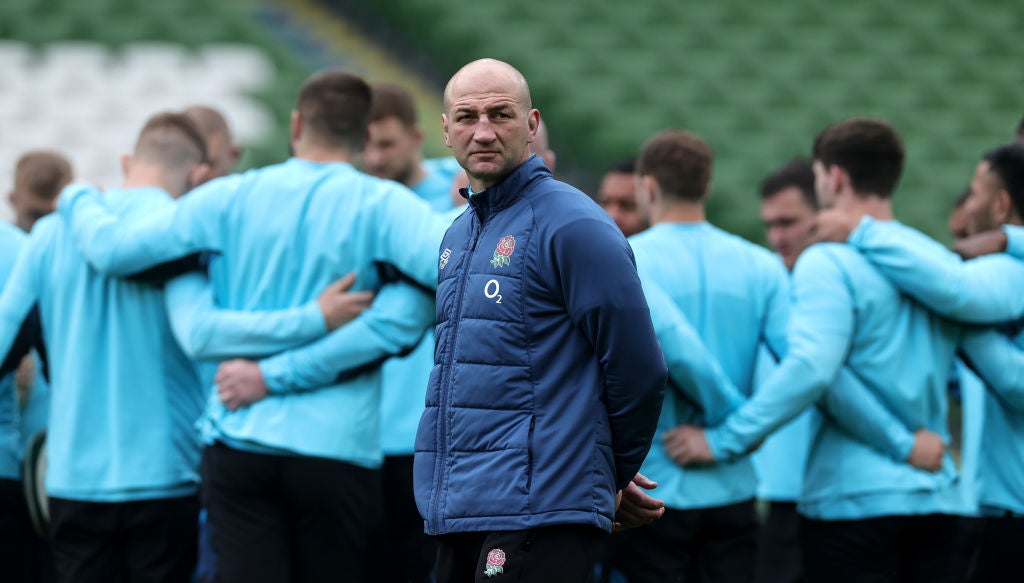
As Ireland shuffled their unwelcome guests out of the door, the celebrations could properly begin. For England’s players it felt strikingly familiar – as in Paris 12 months ago on, left to watch through the windows, without an invite to the hottest party in town. The Six Nations grand slam may have been harder won than expected, in the end, but no one could dispute that Ireland’s triumph was richly deserved.
“This is a high point, but I hope it’s not the highest point,” Johnny Sexton said after lifting the trophy, already on to the next challenge before the carouse to come. “Roll on the World Cup – that’s what we need to focus on now.”
Who knows how the game might have played out without Freddie Steward’s dismissal, but you fancy Andy Farrell’s achievers would have found a way whatever the circumstances.
Ireland may have been dragged into a Saturday evening scrap but each of their five wins across the tournament came by a margin of at least 13 points. Throughout the last three years, Farrell and his staff have meticulously placed their jigsaw pieces with few missteps, crowning a commanding campaign with a clean sweep with conviction there is more yet to be won.
That England were only ever going to be able to play spoilsport spoke to the structural superiority that Ireland currently have. The provincial system continues to churn out consistent Champions Cup and URC contenders but still ensures the national set-up maintains overall control. On Sunday, Ireland’s under-20s sealed back-to-back Grand Slams – their talent pipeline continues to flow.
The non-negotiables at times bartered over in England’s capitulation to France were at least present at the Aviva Stadium, ensuring a partial saving of face and some signs of direction. Physically and mentally, they were firmly in the fight, even after Steward’s unfortunate red card.
But the bare facts are that England end their international season with a record of four wins from ten games, finishing with just two Six Nations wins in three successive tournaments for the first time.
Where Ireland are three deep with proven performers at many positions, Steve Borthwick is still yet to nail down the bones of his side.
How many of his Dublin starters are likely to again be named when England begin their World Cup in Marseille against Argentina on 9 September? Ellis Genge at loosehead, almost certainly. Jamie George, Maro Itoje and Kyle Sinckler, perhaps, though it is a little while since any of the trio produced their best in an England shirt. It would now be a surprise if Owen Farrell is usurped, and Freddie Steward is nailed on at full-back.
Beyond that? Borthwick’s notebook will be full of question marks. Zach Mercer is expected to be in contention at No 8 when back available for the four summer warm-up tests, which include another trip to Dublin. The England head coach is considering tweaks to pre-tournament camp plans put in place by his predecessor.

The extended lead-in to the tournament reduces the player access advantages other nations have, allowing strategies to be better implemented and cohesion to develop. The addition of fitness guru Aled Walters, loved at Leicester and a 2019 winner with South Africa, should have a positive impact. Things are rarely as bad as they seem, and England will improve come the World Cup, but, as a misguided former British prime minister found, any thought of a swift bridging of the gap over the Irish Sea is far-fetched.
England’s Test cricket counterparts show that quick change can be compelled but the schisms in English rugby are easily uncovered. Borthwick has already begun to murmur his discontent about aspects of the Professional Game Agreement (PGA), a deal that works for neither him nor the clubs from which he picks.
The agreement is currently up for renegotiation, but any changes will not be implemented until the summer of 2024. It is at that point that the Premiership will have a soft relaunch, in the hope that more eyes may be drawn to a consistently entertaining product that may be shrunk slightly in the hope it will better prepares combatants for international rugby. Now may be a time for a wider look at the English game and bold, fresh direction above Borthwick.
Because it is hard to escape the feeling that England have entirely wasted this four-year cycle. The RFU indulged Eddie Jones’s World Cup obsession beyond the point of no return, only to then change course without letting the Australian execute his plan. It may be that fraying relationships made Jones’s position untenable, but it has left Borthwick learning on a rush job with a squad ill-equipped to challenge the world’s best. While Ireland can look towards the autumn with the confidence of true contenders, it could take a fairy tale or two for England to even be at the World Cup ball.
Scotland 26-14 Italy
The last minutes of their final Six Nations game served as a neat encapsulation of Italy’s tournament, so close yet so far. A single competition point and another wooden spoon are hardly just reward for a campaign that saw Italy genuinely trouble every side they played. Some extra street smarts and game savvy may be required, but Kieran Crowley’s young squad will come again.
At the start of this campaign the indications were that this would be Gregor Townsend’s last Six Nations as Scotland head coach, though it now appears the former fly-half may continue on beyond the World Cup. It feels a bit of a gamble to retain a coach now six years into the role, even if his side continue to show development – and a group stage exit that unfortunately feels likely in France could make any extension look foolish.
France 41-28 Wales
France’s follow-up to their Twickenham record did not sound quite as sweet, but there were still more than enough mellifluous moments to out-do Wales. Warren Gatland’s side were much improved and seemed to catch their hosts off guard with a more adventurous offloading game – if this was a Six Nations farewell for some of their old troupers as Gatland forecast, then at least they finished with something of a flourish.
Defensively, a few lax moments will irk the France coaching staff but the manner in which the stadium stirred every time their side enlivened only whets the appetite for the autumn, when packed grounds across the country should only accentuate a tournament that promises so, so much.







